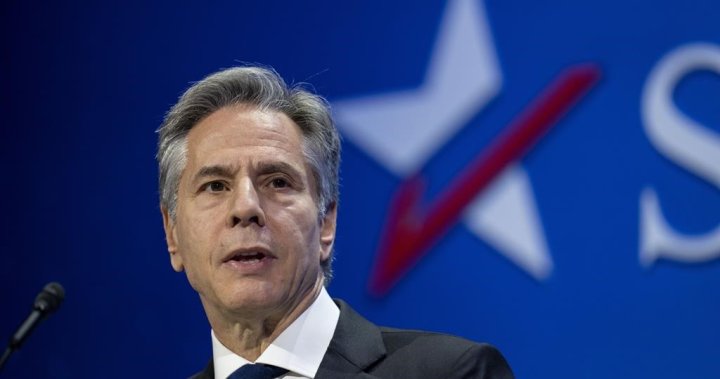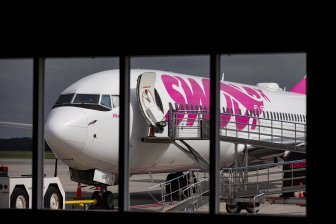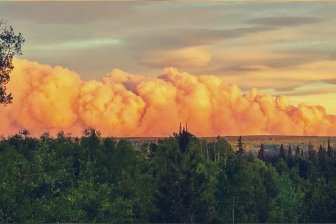U.S.-China talks to be held in Beijing months after spy balloon scuttled plans – National | Globalnews.ca
U.S. Secretary of State Antony Blinken will travel to China next week for long-delayed talks aimed at stabilizing tense relations, and a U.S. official said he is expected to be there on June 18.
Reuters reported on Wednesday that Blinken would travel to China in the coming weeks, citing an official who spoke on condition of anonymity.
An official on Friday said Blinken would be in Beijing on June 18, but gave no other details.
The Associated Press also confirmed the trip, citing U.S. officials who spoke on condition of anonymity because neither the State Department nor the Chinese foreign ministry have yet confirmed the trip.

In February, Washington’s top diplomat scrapped a planned trip to Beijing, which would have been the first by a U.S. secretary of state in five years, over a suspected Chinese spy balloon that flew over the United States.
Since then, there have been contacts between the U.S. and China, but they have been rare as tensions have risen over China’s conduct in the South China Sea, aggressive actions toward Taiwan and support for Russia’s war against Ukraine.
Last week, China’s defense minister rebuffed a request from U.S. Defense Secretary Lloyd Austin for a meeting on the sidelines of a security symposium in Singapore.
However, China’s commerce minister traveled to the U.S. last month and Biden’s national security adviser Jake Sullivan met with China’s top diplomat, Wang Yi, in Vienna in early May.
The White House said at the time that the meeting “was part of ongoing efforts to maintain open lines of communication and responsibly manage competition. The two sides agreed to maintain this important strategic channel of communication to advance these objectives.”
More recently, the top U.S. diplomat for the Asia-Pacific region, Daniel Kritenbrink, traveled to China earlier this week along with a senior National Security Council official.

Washington has been keen to reschedule the Blinken trip, and the timing emerged after the Wall Street Journal reported on Thursday that China has reached a secret deal with Cuba to establish an electronic eavesdropping facility on the island roughly 100 miles (160 km) from Florida.
The spokesperson for the White House National Security Council on Thursday said the report was not accurate, while saying that Washington has had “real concerns” about China’s relationship with Cuba and was closely monitoring it.
The State Department, White House and Pentagon did not, however, immediately respond to requests for comment on a subsequent New York Times report that said China was planning to build a facility in Cuba that U.S. officials were concerned could be capable of spying on the United States by intercepting signals from nearby U.S. military and commercial facilities.
In Havana on Thursday, Cuban Vice Foreign Minister Carlos Fernandez de Cossio dismissed the Journal report as “totally mendacious and unfounded,” calling it a U.S. fabrication meant to justify Washington’s decades-old economic embargo against the island nation. He said Cuba rejects all foreign military presence in Latin America and the Caribbean.
China’s foreign ministry said on Friday that “spreading rumors and slander” was a common tactic of “hacker empire” the United States.

The Cuba issue could raise questions about Blinken’s planned trip, intended by Washington to be a major step toward what President Joe Biden has called a “thaw” in relations between the world’s two largest economies.
U.S. Senator Mark Warner, chairman of the Select Committee on Intelligence, and Senator Marco Rubio, the panel’s vice chair, said on Thursday they were “deeply disturbed” by the Journal report and urged the Biden administration “to take steps to prevent this serious threat to our national security and sovereignty.”
A spokesperson for China’s Washington Embassy said it had no information about Blinken’s trip, but referred to Biden and Chinese President Xi Jinping’s last meeting in November, and added: “China is open to having dialogue with the United States. We hope the U.S. will work in the same direction with China, and jointly implement the important common understandings between the two Presidents in their Bali meeting.”
(Reporting by Humeyra Pamuk, Jasper Ward, David Brunnstrom, Jeff Mason and Phil Stewart; Editing by Leslie Adler)
For all the latest world News Click Here




